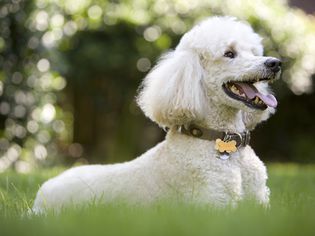Can dogs eat Brussels sprouts? Yes, when fed in moderation and properly prepared, Brussels sprouts can be a nutritious snack for your dog, says Kelly Hood, DVM. However, as with any new food, it’s important to introduce them gradually and observe for any adverse reactions.
Here’s what you need to know about safely feeding your pup this green veggie.
Meet the Expert
Kathryn Dench, DVM, MA VetMB, MRCVS, is a small animal veterinarian in private practice and the Chief Scientific Advisor at Paw Origins.
Kelly Hood, DVM, is a veterinarian at Highlands Veterinary Center and the in-house veterinarian at Pet Portraits.
Benefits of Brussels Sprouts for Dogs
Brussels sprouts can provide numerous health benefits for dogs when given occasionally as part of a balanced diet. Here are some key advantages:
- Rich in nutrients: Brussels sprouts are packed with essential vitamins and minerals. According to Kathryn Dench, DVM, MA VetMB, MRCVS, they’re an excellent source of vitamins A, C, and K, which contribute to the overall health of a dog’s immune system, skin, coat, and bone health.
- High in antioxidants: This veggie is loaded with antioxidants, especially kaempferol, which help protect your dog’s cells from damage caused by free radicals. Hood says the antioxidants in Brussels sprouts can also help reduce inflammation, which is particularly helpful for older dogs with joint issues.
- High in fiber: The fiber content in Brussels sprouts aids in digestion by promoting healthy bowel movements and preventing constipation.
- Low calorie: Brussels sprouts are a low-calorie food, making them an excellent treat for dogs who need to maintain or lose weight.
- Low in sugar: Brussels sprouts contain very little sugar, making them a healthy choice for dogs. While some sugar is useful for dogs as an energy source, too much sugar, even from healthy sources like fruit, can contribute to or exacerbate health problems like diabetes.
Risks and Considerations
While Brussels sprouts can be a healthy treat for your dog in small amounts, there are a few risks and considerations to keep in mind when feeding your dog this veggie.
- Digestive issues: “Brussels sprouts can cause gas due to their high fiber and isothiocyanate content, a compound that aids in cleaning the intestines but might lead to flatulence,” says Dench. In excessive amounts, they can also lead to stomach upset, diarrhea, and vomiting, adds Hood. Both vets recommend introducing Brussels sprouts into your dog’s diet slowly and in small amounts to avoid digestive upset.
- Choking hazard: “Whole Brussels sprouts could be a choking hazard, especially for smaller dogs,” says Hood. “You should always cut them into smaller pieces just to be on the safe side.”
- Allergic reaction: While rare, dogs can have allergies or sensitivities to Brussels sprouts. Monitor your dog closely for any signs of allergic reactions, such as itching or swelling, after introducing Brussels sprouts to their diet. If any adverse reactions occur, discontinue feeding and consult your veterinarian.
- Oxalate content: Brussels sprouts contain a small amount of oxalic acid, says Hood. “It’s not usually a problem, but in large quantities, it could potentially contribute to kidney or bladder stones in dogs that are prone to them — but you’d have to be feeding a lot of sprouts for this to be a real concern.”
How to Safely Feed Brussels Sprouts to Dogs
How you prepare Brussels sprouts is crucial to your dog’s safety and well-being. Dench recommends steaming or boiling them, as raw Brussels sprouts can be tougher on a dog’s digestive system, potentially causing more gas or gastrointestinal discomfort.
Brussels sprouts should always be served to your dog plain, without any added salt, butter, sauce, or seasonings, especially garlic and onion, which are toxic to dogs.
As for portion size, Dench lays out some general guidelines:
- Small dogs: One Brussels sprout
- Medium dogs: Two Brussels sprouts
- Large dogs: 3-4 Brussels sprouts
“But keep in mind that every dog is different,” adds Hood. “Some might have more sensitive stomachs than others.”
Hood also stresses that human food, including Brussels sprouts, should never make up the bulk of a dog’s diet. “Your dog’s regular food should still be doing the heavy lifting nutrition-wise.”
Alternatives to Brussels Sprouts
There are many other veggies that dogs can safely enjoy as an occasional treat, some of which include:
- Green beans
- Peas
- Carrots
- Cucumbers
- Sweet potatoes
- Zucchini
- Pumpkin
- Broccoli
- Spinach
- Bell peppers
- Cabbage
- Celery
- Cauliflower
- Asparagus
- Lettuce
Remember to always consult with a veterinarian before introducing a new food to your dog’s diet. Safety first!








